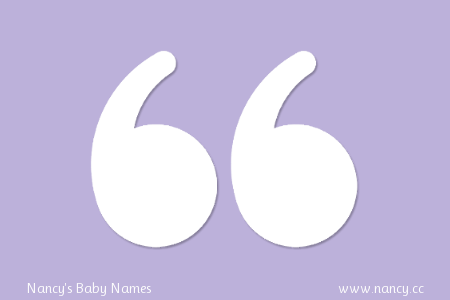Time for another batch of name quotes!
From a recent Deseret News article about Utah’s unusual baby names by Meg Walter:
Heather Marné Williams-Young is named after Marné Whitaker Tuttle. According to legend, Marné Whitaker Tuttle’s mother named her Marne (with no accent) after the French town on the frontlines of World War I, thinking Marne, which rhymes with barn, was a beautiful name.
But Marné disagreed, so she added the acute accent over the e, and pronounced it “Mar-nay.” “There is nothing more Utah to me than women of a certain generation trying make their names more French by putting accents places they shouldn’t be,” Williams-Young says.
[Marné Tuttle (1920-2014), the wife of LDS church leader A(lbert) Theodore Tuttle, served as “temple matron” in the Provo Utah Temple in the early 1980s. During that time, Heather’s mother worked as a Temple employee. Both Heather’s mother and Heather’s mother’s roommate ended up giving their future daughters the middle name Marné.]
“There are a handful of us around Utah County who were all named after the same woman with the made-up name,” Williams-Young says. “I feel such a kinship with them.”
[One of Marné Tuttle’s own daughters, Clarissa, was also given Marné as a middle.]
From a 2015 article in History Today about Anglo-Saxon personal names by James Chetwood:
While it is hard to tell exactly how important the meaning of name elements were, it seems likely that people were aware, to some extent, that names carried some kind of meaning. Indeed, one of the most famous, or infamous, Anglo-Saxons is most often known to us today as Ethelred the Unready, the king who lost his kingdom to Cnut. However, the name Ethelred signified ‘noble counsel’. So, when his contemporaries labelled him Æðelræd Unræd they were not calling him ‘unready’, but using the meaning of his name to mock his lack of good counsel. Similarly, when Archbishop Wulfstan entitled his homily to the English people ‘Sermon of the Wolf to the English’, he was clearly doing so in the knowledge that the first part of his name did not just sound like, but signified, ‘wolf’. Surely it cannot be coincidence that ‘rich’, ‘strong’ and ‘beautiful’ were used in names, where ‘poor’, ‘weak’ and ‘ugly’ were not.
A feature of this naming system was flexibility. There was a finite number of elements, but they could be combined in a multitude of ways. This meant that, in essence, a name was created for, rather than given to, each person. So, while elements could be repeated to emphasize parentage and family links, there was very little repetition of full names and it would be unlikely that any two people within a community or family would have the same name.
From an article about a Georgia man whose name, Neal, came from a POW bracelet:
His father, the late John Carpenter, was an aircraft mechanic in the Navy and was deployed overseas at the time. He arrived home in time for his son’s birth. When it became necessary to scramble and find a boy’s name, John Carpenter looked down at the POW/MIA bracelet he was wearing.
The engraved name was Neal Clinton Ward Jr. He had been listed as Missing in Action since June 13, 1969. An airman, his plane had been shot down over Laos in the jungles of Southeast Asia, nine days before his 24th birthday.
The Carpenters named their son Neal Ward Carpenter.
(Neal’s mom had been convinced the baby would be a girl. Neal said: “I was going to be April Michelle, and that’s all there was to it.”)
From a Cup of Jo post about offbeat middle names:
My friend gave her baby the middle name “Swift” because her labor was so quick.
Our friends chose the middle name “Buffalo” for their son because it was his dad’s nickname growing up. “It took my husband nine months to convince me,” my friend told me. “Then, in the middle of the night after signing the birth certificate, I had a mild panic attack at the hospital. Now I love it.”
From a collection of baby name stories contributed by Long Island moms:
My grandfather hated tattoos. He used to tell his standard stories and would say only people who had tattoos in ‘his day’ were sailors. He said their tattoos always said either ‘death before dishonor’ or ‘true love Mabel.’ He always used Mabel as the example name. I’m not sure why. He died in 2013. We named our daughter Mabel as a nod to him.
From the blog of UK historian Elizabeth Walne:
Some first names can be very helpful in providing an approximate birth date for an individual if you are unsure. I once researched a family with sons Foch, Petain and Joffre – all Marshals of France during WWI, effectively ‘dating’ them to around 1914-18.
Another example with less specific dates is the girl’s name ‘Adelaide’ which became popular with Adelaide, wife of William IV (born 1792, crowned Queen Consort 1831 and died 1849) and then fell in popularity – but importantly for red herring purposes didn’t disappear completely – after the turn of the century.
How columnist Richard Ord chose a middle name for his son:
His great grandad on his mother’s side was called Aston, so my wife told me, and so that became his middle name.
It wasn’t until a few months after his birth that my wife’s dad asked me about where the name came from.
Surprised, I told him that he took the family name of Aston. “You know, after his great grandad?!”
“Oh,” he replied. “But that wasn’t his name. That was his nickname. His mates called him Aston because he was the only Aston Villa supporter in the West End of Newcastle!”
In my book that makes his middle name even better.







